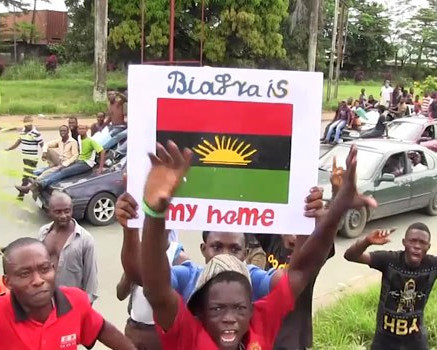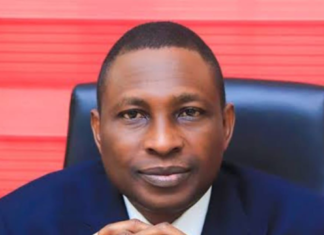By Emeka Alex Duru
Not even the harshest critics of the Biafra self-determination agenda would deny the success of the May 30 sit-at home directive by the Indigenous Peoples of Biafra (IPOB).
IPOB, which has been in the forefront of the current phase of revitalisation of the aborted Biafra project, had asked the Igbo and their neighbours in the South East and beyond to set aside the date in remembering their relations who lost their lives before, during and after the 1967 to 1970 civil war in the country.
Genesis of the war
Governor of the defunct Eastern Region, Colonel Chukwuemeka Odumegwu Ojukwu, had proclaimed the Peoples Republic of Biafra on May 30, 1967, in response to the large scale pogrom directed at his Igbo kinsmen and their neighbours, chiefly in the North, from May 29, 1966, through the July 29, 1966 counter-coup and thereafter. Following the inability of the federal forces led by Yakubu Gowon and Ojukwu’s Biafra to arrive at amicable settlement to the crisis in the land, war broke out between the two camps.
Commentators estimate Biafrans lost in the upheavals at over three million, aside properties and resultant displacement in national politics.
Solidarity
It was in saluting the courage of Biafrans – men and women, including children who lost their lives in the period – that IPOB urged the people to show them respect by staying off their various commercial activities on May 30.
The government, obviously uncomfortable with the declaration, swung into action, asking the people to ignore the directive, assuring them of adequate protection.
But by the close of the day, it was obvious that the sit-at-home action was a resounding success. Reports from the entire five South East states and neighbouring Rivers, Akwa Ibom, Cross River, Delta and Benue pointed to impressive compliance to the appeal. And in what amounted to a rare development, no life was lost in the exercise. There were also no reports of skirmishes between IPOB activists and law enforcement agents.
Since the successful outing, members and non-members of the organisation have been in various forms of excitement. There were even reports during the week that, apparently buoyed by the encouraging report on the exercise, IPOB leader, Nnamdi Kanu, flew into Enugu last Wednesday for a meeting with some Igbo leaders on the next line of action.
Some members of the organisation even see in the success of the heroes’ day outing as an indication of the attainment of the Biafra revitalisation project being within reach.
Kennedy Ezeagu, an IPOB activist, thinks in this direction. In an encounter with TheNiche, he enthused that with what happened on May 30, attainment of Biafran independence is now a matter of weeks or months. In his words, “you can see what happened. It shows that the entire Igbo land and beyond are behind us. The whole world is also behind us. Just watch and see what will happen in the next couple of weeks or months.”
Divergent views
Some concerned analysts however express contrary views. A History teacher in Nnamdi Azikiwe University (NAU), Awka, who spoke to our reporter on the issue, warned on the dangers of IPOB activists mistaking adherence to the sit-at-home directive for endorsement of activities of the organisation. “They are two different things. Abiding by the sit-at-home directive should not be confused with keying into Nnamdi Kanu’s Biafra agenda. They are not. In staying off their activities, the people simply paid tribute to those that lost their lives in the civil war 50 years ago when Biafra was declared.
“There is hardly any family in Igbo land and our neighbours who believed in Biafra that did not lose somebody or something during the war. It was more in memory of those who lost their lives that people yielded to the sit-at-home directive and not in support of Kanu and his members.
“There was no how my family and I would have been part of the exercise if it was in sympathy with the IPOB agenda. I don’t believe in what they are doing. I won’t be part of anything that will expose our people to another round of elimination or displacement.
“Self-determination is a conscious programme borne out of defined agenda. It is not a tea party, nor an issue of mere juvenile excitement,” he said.
Emma Ogbuehi, a public affairs analysts, has a different interpretation of the matter. According to him, there is nothing in the agitation if it is the will of the people and not an agenda by a few. His concerns however centred on the possibility of attaining the dream, given some issues that need to be comprehensively defined.
Geography
These, he said, involved such items as the proper definition of the real geography of the new Biafra, convincing the people that the reasons that necessitated the earlier Biafra still exist, as well as the economic viability of the new nation, if ever it is actualised.
“Unless these questions are convincingly answered, it is my view that we leave the issues the way they are, instead of embarking on an action we cannot sustain,” he suggested.
Economic concerns
Perhaps, more than any other consideration, the economic viability of the envisaged Biafra is what bothers analysts most. The argument, for instance, is that, perhaps, due to inertia or lack of vision, the political leadership of the South East has not been able to evolve policies that can see the zone standing on its own, if the need arises.
With near total dependence on paltry fall-outs from the monthly federation allocation from Abuja, there has not been any conviction of the states in the area holding out comfortably in the allocations are halted.
In fact, the recent state viability index released by Economic Confidential, an economic intelligence magazine, laid bare the vulnerability of the states in the states that would easily be grouped into the new Biafra.
Aside Enugu, all other states in the region fell into the group with less than 10 per cent of their internally-generated revenue (IGR) in relation to their Federation Account Allocations (FAA) in 2016.
Analyst see this as an issue that needs to be addressed in any discussion about the new Biafra.












